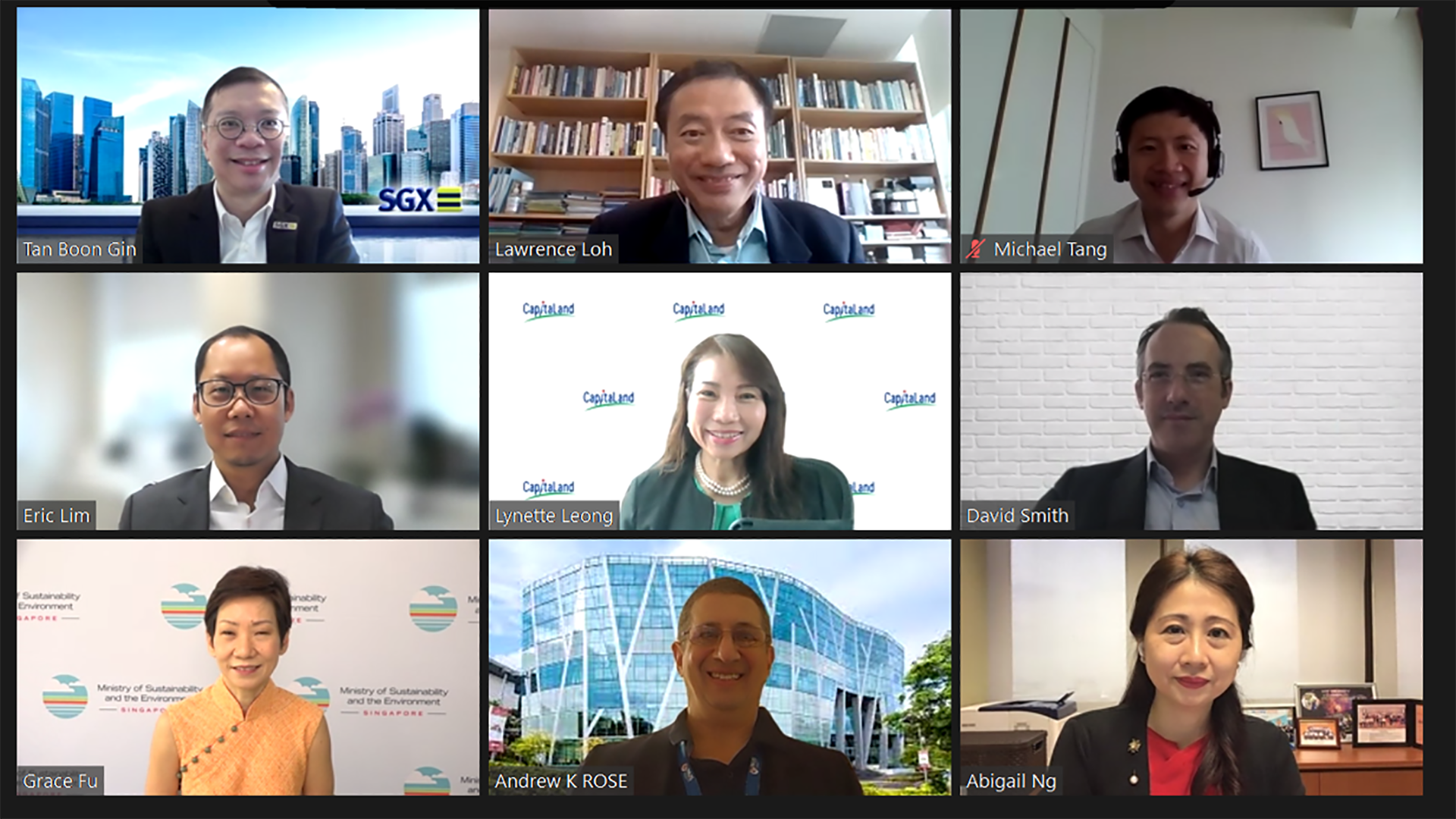Sustainability: Not a buzzword but a business must-have
Sustainability is a “must-have” and not just a “good-to-have” for businesses. This was the point emphasised by panellists at the virtual forum “Sustainability Reporting Review 2021”.
The event was jointly organised by the Centre for Governance and Sustainability (CGS) at NUS Business School and Singapore Exchange Regulation (SGX RegCo) on 19 May. Attracting over 500 people, it unveiled findings from a 2021 SGX RegCo-CGS review of how Singapore-listed companies fared in their sustainability reporting and disclosure, compared to the last review in 2019.
This year’s review had shown an improved performance by listed companies. CGS Director Associate Professor Lawrence Loh, who presented the findings at the webinar, pointed out that listed companies’ average overall scores rose to 71.7 points from 60.6 in 2019, with broad-based gains regardless of listing board, size and industry sector. Small-capitalisation companies also showed the largest increase in average scores, compared to middle-capitalisation and big-capitalisation companies.
“Better sustainability reporting can help companies attract environmentally-conscious customers, obtain lower-cost financing and gain better access to capital. This improves resilience in the face of future challenges,” noted Assoc Prof Loh.
In his opening address, NUS Business School Dean and Distinguished Professor Andrew Rose said, “The progress of a country has never been measured purely by its GDP growth, but it is also evaluated for its sustainable development, and the preservation of precious resources for future generations.” He expressed hoped that sustainability efforts by the listed companies would serve as an example for other companies and organisations to follow.
Guest-of-Honour Ms Grace Fu, Minister for Sustainability and the Environment, congratulated all companies for the progress made in sustainability reporting, and commended the collective effort in raising reporting capabilities.
She added, “I also thank NUS for the thought leadership provided in this space over the years, by spearheading relevant and high-impact research on governance and sustainability issues, including this round of review. Let us build on the progress made in this space and continue to seek ways to further improve ESG reporting and disclosures together. “
Virtual forum gathered varied insights
Assoc Prof Loh also moderated the virtual discussion that ensued, which involved industry representatives and regulators as panellists. Touching on topics such as balanced disclosures and the integration of sustainability with business, the forum surfaced many refreshing insights from the participants.
On the findings, Ms Abigail Ng, Executive Director of the Corporate Finance and Consumer Department at the Monetary Authority of Singapore, said it was good to see more balanced disclosures. She pointed out that when investors know both the risks and opportunities facing the company, they are able to make more informed investment decisions.
Meanwhile, Ms Lynette Leong, Chief Sustainability Officer at CapitaLand, felt that in improving the scores of companies in different industries, there needs to be proper guidance as to how each of the industries can do its reporting.
Reporting need not be viewed as a burden
It is encouraging that smaller listed companies have been faring better in their disclosures, said Dr David Smith, Head of Corporate Governance at Aberdeen Standard Investments. However, he wondered “if it’s just a tick in the box, or whether they are really getting the right advice or the right knowledge that allows them to adapt their business models”.
On integrating sustainability with business, Dr Smith shared that companies need not view reporting as a mandatory burden. Instead, the reporting can feed into discussions around strategy and business resilience that the company should already be having.
Mr Eric Lim, Chief Sustainability Officer at United Overseas Bank, recognised that there are challenges in corporate disclosures. These include various reporting standards, and different stakeholders who look out for different things. However, he also likened the whole process to a journey of sorts.
“I think one of the important things to realise is that sustainability reporting starts as a journey where you're not so sure yet about how to talk about your sustainability strategy. In this journey, you try to cover all the bases, but as the strategy and reporting mature, we need to be able to shift from covering everything to covering the stuff that really matters,” he said.
Assoc Prof Loh summed up the discussion by saying, “Indeed, it’s ultimately about companies themselves realising the benefits beyond just complying to regulations. They must see the higher purpose of sustainability. That’s what matters most of all.”
In his closing remarks, Mr Tan Boon Gin, Chief Executive Officer of SGX RegCo, pointed out that investors are increasingly conscious about sustainable investing options and more will likely choose this kind of investing in the future. “I urge issuers to join us in raising the floor in driving companies and society towards a more sustainable and greener future,” he said.




